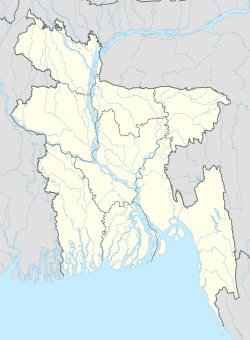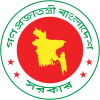Dinajpur
This article needs additional citations for verification. (November 2014) |
Dinajpur
দিনাজপুর | |
|---|---|
City and Municipality | |
|
From top (clockwise): Gor-e-Shahid Eidgah, Dinajpur Railway Station, Dinajpur Museum & Hajee Mohammad Danesh Science & Technology University | |
| Coordinates: 25°37′44″N 88°38′13″E / 25.629°N 88.637°E | |
| Country | |
| Division | Rangpur |
| District | Dinajpur |
| Upazila | Dinajpur Sadar |
| Government | |
| • Type | Mayor–Council |
| • Body | Dinajpur Municipality |
| • Paura Mayor | Syed Jahangir Alam[1] |
| Area | |
| • Total | 22.8 km2 (8.8 sq mi) |
| Population | |
| • Total | 212,275 |
| • Density | 9,300/km2 (24,000/sq mi) |
| • Ethnicities | Bengali |
| Time zone | UTC+6 (Bangladesh Time) |
| National Dialing Code | +880 |
| Website | www |
Dinajpur (Bengali: দিনাজপুর [dinad͡ʒpur]) is a city and the district headquarters of Dinajpur district situated in Rangpur Division, Bangladesh. It was founded in 1786. It is located 413 km north-west of Dhaka in Bangladesh. It is bounded on the north by Suihari, Katapara, Bangi Bechapara, Pulhat, and Koshba on the south; on the east by Sheikhupura; and by the river Punarbhaba on the west.
Geography and climate
[edit]
Dinajpur is located in the north-western part of the country. It covers an area of 20.7 square kilometers (8.0 sq mi).
It is situated at 25°37′N 88°39′E on the eastern bank of the river Punarbhaba. Dinajpur has a humid subtropical climate (Cwa) that borders a tropical climate and has humid, hot summers, characterized monsoon season and mild, dry winters.
| Climate data for Dinajpur (1991–2020) | |||||||||||||
|---|---|---|---|---|---|---|---|---|---|---|---|---|---|
| Month | Jan | Feb | Mar | Apr | May | Jun | Jul | Aug | Sep | Oct | Nov | Dec | Year |
| Record high °C (°F) | 29.5 (85.1) |
33.5 (92.3) |
37.3 (99.1) |
41.0 (105.8) |
41.2 (106.2) |
40.7 (105.3) |
38.9 (102.0) |
38.6 (101.5) |
37.4 (99.3) |
36.1 (97.0) |
33.5 (92.3) |
30.5 (86.9) |
41.2 (106.2) |
| Mean daily maximum °C (°F) | 22.6 (72.7) |
26.6 (79.9) |
30.9 (87.6) |
32.6 (90.7) |
32.8 (91.0) |
32.9 (91.2) |
32.4 (90.3) |
32.7 (90.9) |
32.2 (90.0) |
31.3 (88.3) |
29.2 (84.6) |
25.0 (77.0) |
30.1 (86.2) |
| Daily mean °C (°F) | 15.6 (60.1) |
19.4 (66.9) |
24.0 (75.2) |
26.8 (80.2) |
28.0 (82.4) |
29.0 (84.2) |
29.0 (84.2) |
29.2 (84.6) |
28.4 (83.1) |
26.5 (79.7) |
22.2 (72.0) |
17.7 (63.9) |
24.7 (76.5) |
| Mean daily minimum °C (°F) | 10.3 (50.5) |
13.3 (55.9) |
17.6 (63.7) |
21.4 (70.5) |
23.6 (74.5) |
25.6 (78.1) |
26.3 (79.3) |
26.4 (79.5) |
25.5 (77.9) |
22.5 (72.5) |
16.7 (62.1) |
12.3 (54.1) |
20.1 (68.2) |
| Record low °C (°F) | 3.2 (37.8) |
6.2 (43.2) |
10.0 (50.0) |
14.3 (57.7) |
16.5 (61.7) |
20.0 (68.0) |
22.8 (73.0) |
23.4 (74.1) |
20.7 (69.3) |
16.4 (61.5) |
10.5 (50.9) |
6.0 (42.8) |
3.2 (37.8) |
| Average precipitation mm (inches) | 9 (0.4) |
11 (0.4) |
15 (0.6) |
74 (2.9) |
214 (8.4) |
358 (14.1) |
387 (15.2) |
337 (13.3) |
373 (14.7) |
148 (5.8) |
6 (0.2) |
5 (0.2) |
1,937 (76.3) |
| Average precipitation days (≥ 1 mm) | 1 | 2 | 2 | 6 | 12 | 17 | 20 | 17 | 15 | 6 | 1 | 1 | 100 |
| Mean monthly sunshine hours | 183.0 | 214.1 | 250.6 | 222.2 | 212.6 | 160.2 | 154.5 | 171.4 | 172.1 | 227.3 | 235.9 | 205.4 | 2,409.3 |
| Source: NOAA[3] | |||||||||||||
Demographics
[edit]According to the 2022 Bangladesh census, Dinajpur city had a population of 212,275 and a literacy rate of 88.79%.[2]: 388–394
According to the 2011 Bangladesh census, Dinajpur city had 40,929 households and a population of 186,727. 31,320 (16.77%) were under 10 years of age. Dinajpur had a literacy rate (age 7 and over) of 75.37%, compared to the national average of 51.8%, and a sex ratio of 942 females per 1000 males. The ethnic population was 2,402 (1.29%), of which 1,385 were Santal and 777 Oraon.[4]
Education
[edit]Over the last 25 years, Dinajpur has attracted some prominent educational institutions, all of which are government financed. They are as follows:
Hajee Mohammad Danesh Science & Technology University is located 13 km north of Dinajpur town and is one of the prominent institutions in North Bengal. It offers various undergraduate programs such as computer science, BBA, agriculture, fisheries, veterinary medicine and postgraduate programs like agronomy, horticulture and soil science.
Established in 1992, M Abdur Rahim Medical College (former Dinajpur Medical College) is one of the 36 government financed medical institutions located at historical Ananda sagar area in Dinajpur City. Currently, it offers a five-year MBBS Program, along with a one-year compulsory post-graduation internship program. In 2009, Dinajpur city began an English version of education. Some notable English Version schools are: Bethel Int'l School, Dinajpur Ridge School, Dinajpur Labrotary School, Dinajpur Public School, South Point School and Green International School. Dinajpur Polytechnic Institute, Textile Institute Dinajpur, Saint Philip's High School & College, Saint Joseph School Dinajpur, Dinajpur Zilla school, Dinajpur Govt.Girls High School, Dinajpur High School, Dinajpur Police Line School, Dinajpur Collectorate School & College, Dinajpur Govt. College, is one of the best institutions in Dinajpur.
Tenth educational board of Bangladesh has been established in Dinajpur in 2007. From 2009 S.S.C. (Secondary School Certificate) and H.S.C. (Higher Secondary School Certificate) exams have been started to be taken. In S.S.C. exam for the first time it stood 2nd in the country in the G.P.A. 5 list.
Municipality
[edit]At first, after its formation in 1856, the Dinajpur Municipality used to be run by a town committee presided over by the Deputy Magistrate. This was among the first 40 municipalities in Bengal at that time. Later in 1868, the 'District Town Act' commissioned a chairman of the municipality who replaced the Deputy Magistrate and given a similar rank as a District Magistrate. Mr. Patterson was appointed the first chairman of Dinajpur Municipality in 1869. Now present chairman is Syed Jahangir Alam whose family is a descendent from Bihar, India. It is indicative of how the demography of Dinajpur is largely diversified. People from Maldah, Bihar, Jalpaiguri and Rajsthan state of India can be easily seen sattled here throughout the district and city as well.[5]
Agriculture
[edit]Dinajpur is famous for agriculture. Specially Dinajpur is famous for its Litchi and aromatic rice(Katarivog).
Notable people
[edit]- Air Vice-Marshal Mumtaz Uddin Ahmed, Seventh Chief of Airstaff, Bangladesh Air Force.
- Narayan Gangopadhyay, a Bengali novelist, poet, essayist, and short-story writer, and one of the leading writers of modern Bengali literature.
- Haji Mohammad Danesh, a Bangladeshi politician and communist activist.
- Swami Atmasthananda, fifteenth president of the Ramakrishna Math and the Ramakrishna Mission.
- Debojyoti Mishra, an Indian music director and film composer.
- Liton Das, Cricketer Playing in Bangladesh National Team.
- Shawkat Ali, Prominent novelist.
- Mohammad Farhad, popularly known as "Comrade Farhad", was a guerrilla force commander during the Bangladesh independence war, and the President of Communist Party of Bangladesh and a member of Bangladesh Parliament.
Gallery
[edit]-
Ramsagor
-
Sukh Sagor
-
Matasagor
-
Bangibechar Hat
-
Sunrise
-
Bangibechar Hat.
-
Dinajpur Railway Bridge
-
Horse, Ramsagor, Dinajpur
-
Rain, Dinajpur, Bangladesh
-
Punorvoba River
References
[edit]- ^ "Mayor Dinajpur city's civic body-Dinajpur Municipality". Retrieved 12 September 2019.
- ^ a b Population and Housing Census 2022 National Report (PDF). Vol. 1. Bangladesh Bureau of Statistics. November 2023.
- ^ "World Meteorological Organization Climate Normals for 1991-2020 — Dinajpur". National Oceanic and Atmospheric Administration. Retrieved 13 June 2024.
- ^ a b "Population & Housing Census 2011 (Zila Series & Community Series)". bbs.gov.bd. Bangladesh Bureau of Statistics.
- ^ Mehrab Ali, "History of Dinajpur Pourasava" www.dinajpurmunicipality.com
External links
[edit] Media related to Dinajpur at Wikimedia Commons
Media related to Dinajpur at Wikimedia Commons- Website of Dinajpur Municipality
















